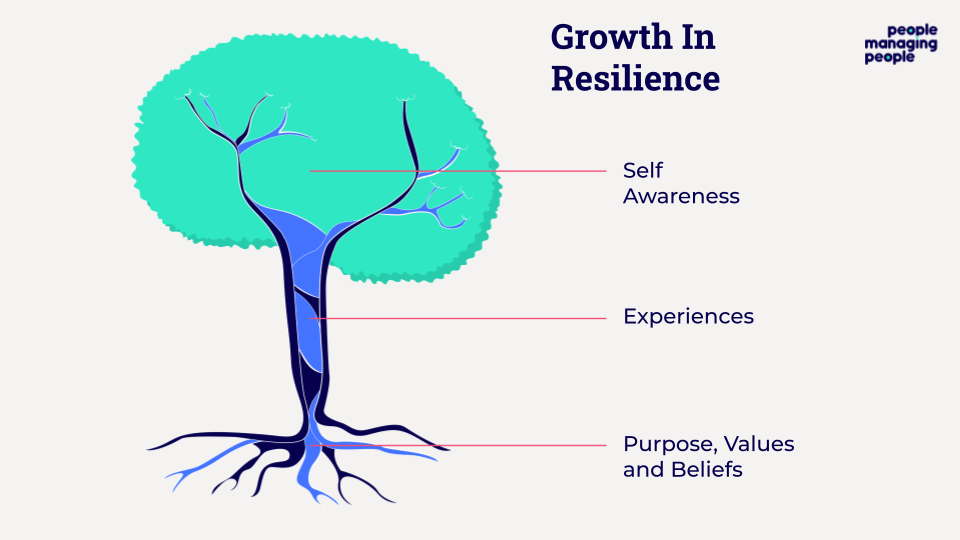“If you fail this test, you might as well get up and leave…”
Fifteen years ago, there I sat in a lecture hall, sweating and almost in tears as those words from my college math instructor got me wondering “Should I quit now and drive the 12 hours back to my little hometown?”
Spoiler alert: I failed the test, but didn’t leave.
In fact, I failed three math exams and still graduated with honours and, even more importantly, learned a valuable lesson on resilience.
Since then, challenges never stopped finding me, but I became better able to face them by reflecting, reframing, and reaching out along the way.
We’ll circle back to how my college experience unfolded, but first here’s the official thesis of this article:
Building resilience requires the 3 Rs: Reflect, Reframe, and Reachout. Putting them into practice helps us to weather the storms in our lives and develop self-awareness.
The 3 Rs Of Resilience
Simply put, resilience is the ability to work through a crisis and return to a pre-crisis state. That’s a simple definition, but what does resilience really mean in a world full of complex people?
When you think of being resilient, remember these three key actions (in no particular order): Reflect, Reframe, Reachout.
Reflect
Reflection means looking back at the situation without applying judgment. Identify what went right and what went wrong. How did you feel?
If you felt angry, sad, or frustrated, identify those feelings. What intentions or motivations did you have in the situation and how did they affect your response?
If you made mistakes in the situation, own them but don’t beat yourself up. Give yourself grace and a moment or two to see the truth in your situation.
When I gave myself permission to reflect back on my college math exam situation, I could see that understanding the content, completing assignments, and studying went right while the test-taking went wrong.
After failing my third exam, my response was to panic, label myself a failure, and want to run away. As one of the more “mature” students in the cohort, I had intended to prove to myself that I could handle the course load after being out of school for many years.
Despite knowing the content, my motivations created a lot of pressure for me to succeed and it backfired. After reflecting, I learned that in order to achieve success, studying my mindset was as crucial as studying the content.
Reframe
An event has happened and you can’t change that. So what now?
Don’t judge yourself by the same destructive story you’ve been telling yourself over and over again in the past. Start by rewriting the script in your head into a better one that’s worthy of a five-star review according to your purpose and values.
At the beginning of my college semester, I labeled myself a failure and disappointment based on my poor exam performance. Instead of letting my purpose and values lead, I had let stressed-out Tim be the leader. When I realized this, I was able to reframe the situation:
My purpose in enrolling in college was to gain the knowledge and skills to better help people. I valued hard work, understanding, and the opportunity to make a difference in the world.
Reachout
You are not alone! Friends, family, colleagues, instructors, even strangers can listen and help.
But do be cautious from whom you seek advice.
Will the advice-giver help and challenge you in a good way, or will they simply tell you everything you want to hear, even if it’s actually destructive? Will they understand or judge?
You might not know right away but, as you take those chances to reach out, you’ll discover pretty quickly who’s got your back and who’s just there for the drama.
Back on campus, after reflecting and reframing my situation, I left my tiny, depressing dorm and went to my instructor’s office to share my struggle and ask for advice.
His response surprised me, and I will never forget it.
“Tim,” he said, “I know you can do this work. I see you helping others in the lab, I see others coming to you for support. Don’t worry, I will pass you regardless of your ability to write a test.”
His vote of confidence made an enormous difference during the rest of my time in college. By reaching out, I was able to get confirmation that my hard work was worth it and that I shouldn’t give up.
Threats Against Resilience
It’s easy to see that it takes effort and courage to build resilience, but are you aware of the threats that could make each process even harder?
Comparison, compromise, and a desperate desire for control hold us back from building resilience.
When you compare, you end up downgrading or dismissing your struggles just because someone else might seem to bounce back so much easier.
If you compromise, you give in and make no move to change your perspective and future.
By grasping for control, you could lose sight of your purpose and values.
The end result of comparing, compromising, and grasping for control is that the problems remain unresolved, and the negative narrative you write in your mind thickens by another chapter.
Growth Through Resilience
Imagine your life as a tree. Your roots are your purpose, values and beliefs—those things are what ground you and make up your identity.
As your tree grows, you experience events. And, unless you were just born this morning, you know that life experiences can be difficult and even painful.
Crises and challenges in life are like the storms, drought, and pollution that a tree must weather in order to survive and thrive.
In order to weather the storm, your tree needs to be resilient. Using the three R’s can help you to build that resilience.
From seasons of overcoming challenges in healthy ways, you come to develop self-awareness and gain a deeper understanding of who you really are.
With that, your tree will bear healthy fruit in the form of stronger relationships, positive impacts, and a greater sense of peace—no matter what comes your way.

Now that you understand the 3 Rs of being resilient and how they’ve impacted on my life, I hope you can see that it’s worth it to push yourself to Reflect, Reframe and Reachout in the face of tough situations.
It can be scary or uncomfortable, but it also nourishes you to be a stronger, healthier human being.
If you're interested in learning more, we have a podcast which we've also transcribed for you to check out: How To Grow Fast In A Sustainable Way (with Manuj Aggarwal from TetraNoodle)


